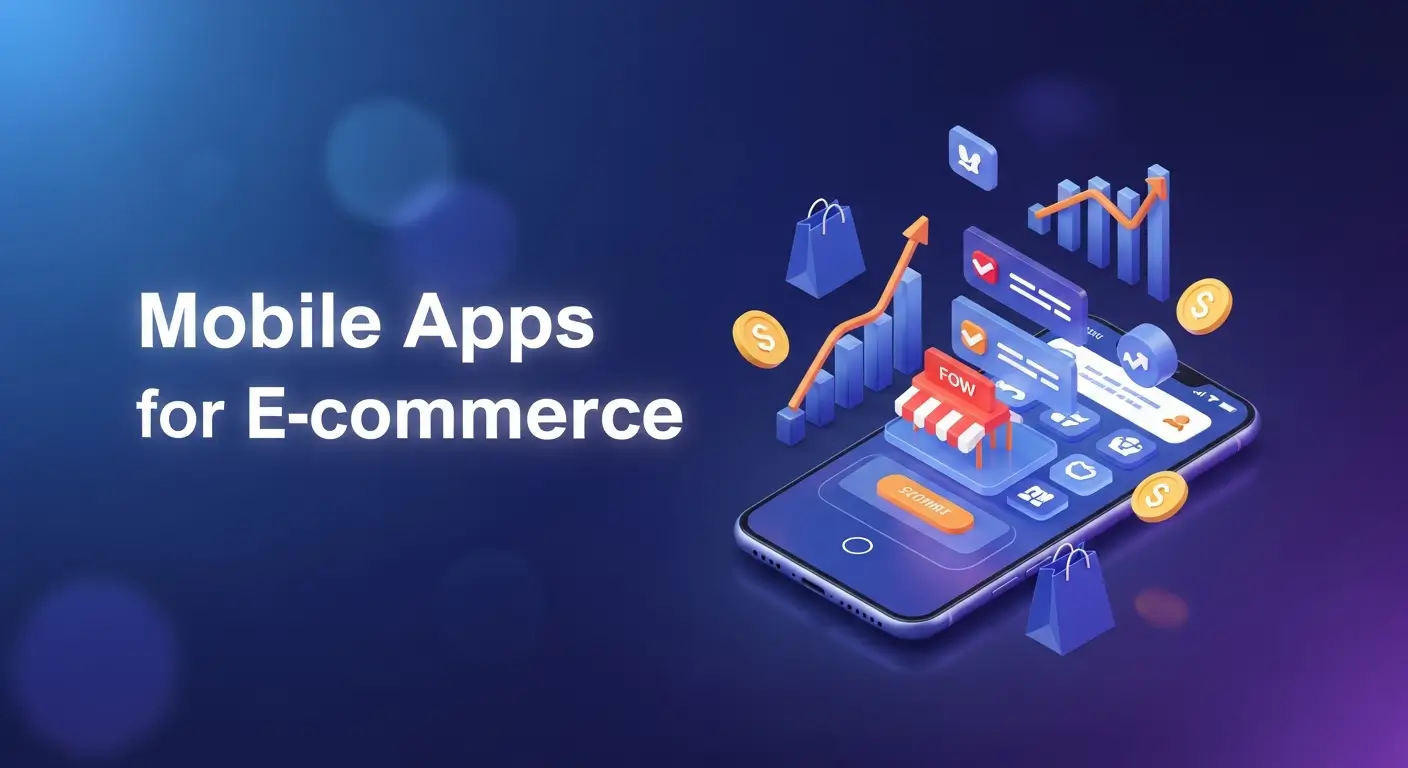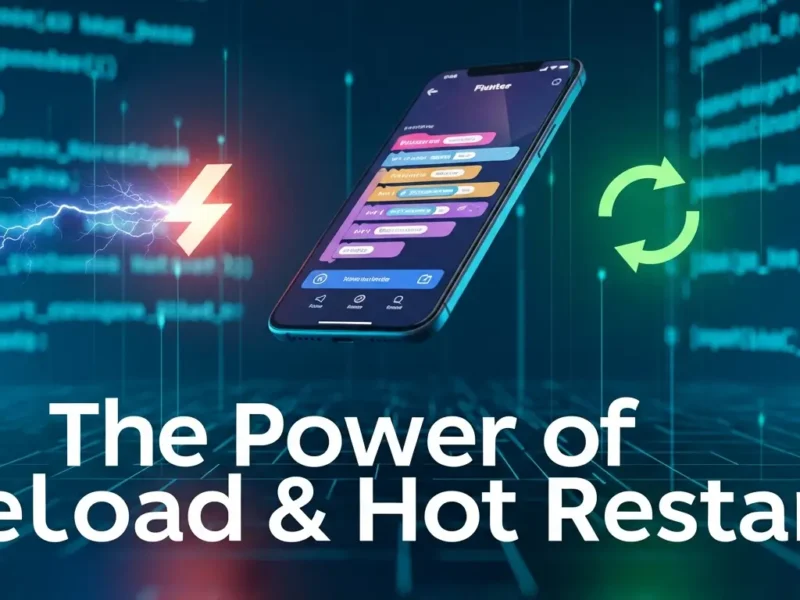In the fast-paced world of digital retail, the device in your customer’s pocket is no longer just a communication tool—it is a 24/7 shopping mall. As we navigate through 2024 and beyond, the distinction between “online shopping” and “mobile shopping” has blurred significantly. For modern retailers, having a mobile-responsive website is merely the baseline; the true competitive edge lies in dedicated mobile apps for e-commerce.
But is investing in a native application worth the cost and effort? The data screams “yes.” With mobile commerce (m-commerce) projected to control the majority of total e-commerce sales globally, businesses that ignore the app market risk being left behind.
In this guide, we will explore how an e-commerce mobile app can transform your business model, skyrocketing your conversion rates and fostering unshakeable customer loyalty.
The M-Commerce Revolution: Why a Website Isn’t Enough
You might be thinking,“I already have a mobile-optimized website. Why do I need an app?”
While mobile websites are essential for discovering new customers (SEO), mobile apps are the powerhouse for retaining them. The fundamental difference lies in user intent and experience. A user on a mobile browser is often browsing or researching. A user who downloads your app is demonstrating a commitment to your brand.
Here is why the mobile app vs. mobile website debate is tipping in favor of apps:
- Speed and Efficiency: Native apps are 1.5 times faster than mobile websites because they store data locally on the device. In e-commerce, speed equals revenue.
- Enhanced UX/UI: Apps offer smoother gesture controls (swiping, pinching) that websites struggle to emulate perfectly.
- Offline Access: Apps can provide basic functionality and content even when the user has a spotty internet connection.
By transitioning customers from a browser to an app, you move them from a distracted environment to an immersive, brand-controlled ecosystem.
How Mobile Apps Skyrocket Sales
The primary goal of any e-commerce venture is increasing revenue. Mobile apps are uniquely engineered to grease the wheels of the sales process, removing friction and encouraging higher average order values (AOV).
1. Reducing Cart Abandonment Rates
Cart abandonment is the plague of e-commerce. On mobile websites, abandonment rates can be incredibly high due to difficult navigation or tedious form-filling on small screens. Apps solve this through saved user data.
When a customer shops via an app, their shipping details, payment methods, and preferences are stored securely. This allows for a “one-click” checkout experience. By reducing the time between “I want this” and “Payment Successful,” you drastically lower the chance of the customer changing their mind.
2. The Power of Push Notifications
This is the single most powerful weapon in the mobile app arsenal. Unlike email marketing, which can get buried in a spam folder, or social media posts, which depend on algorithms, push notifications land directly on the user’s lock screen.
However, the strategy matters. To boost sales, notifications must be personalized:
- Cart Recovery: “Hey Sarah, you left your running shoes behind! Checkout now for free shipping.”
- Flash Sales: “2-Hour Flash Sale! 50% off on your wishlist items.”
- Geofencing: Triggering an offer when a customer is physically near your brick-and-mortar store.
3. Seamless Payment Integration
Modern consumers demand flexibility. E-commerce apps allow for seamless integration with native payment wallets like Apple Pay, Google Pay, and Samsung Pay. When a user can authenticate a purchase with FaceID or a fingerprint rather than typing out a 16-digit credit card number, conversion rates invariably rise.
Building Unshakeable Customer Loyalty
Acquiring a new customer can cost five times more than retaining an existing one.Customer loyaltyis the engine of sustainable growth, and mobile apps are the fuel.
Personalization: The Heart of Retention
Consumers today expect brands to know what they want. Mobile apps allow you to track user behavior—past purchases, browsing history, and dwell time—with greater accuracy than websites.
Using AI and machine learning, your app can curate a personalized homepage for every user. If Customer A buys hiking gear, their app interface should highlight camping equipment, not swimwear. This tailored experience makes the customer feel understood and valued, significantly increasing the likelihood of repeat purchases.
Integrated Loyalty Programs
Remember the old days of carrying a physical punch card for a free coffee? Mobile apps have digitized and gamified this experience.
An in-app loyalty program keeps users coming back. You can implement:
- Point Systems: Earn points for every dollar spent.
- Tiered Rewards: Unlock “VIP Status” for exclusive deals.
- Referral Bonuses: Incentivize users to invite friends.
When customers can track their progress toward a reward in real-time on their phone, they are psychologically motivated to shop exclusively with you to reach that goal.
Superior Customer Support
Trust is a major component of loyalty. Mobile apps allow for the integration of live chat bots or direct support lines within the interface. If a customer has an issue with an order, resolving it within the app (rather than forcing them to find a phone number or send an email) creates a positive service experience, turning a potential complaint into a loyalty-building moment.
Key Features of a High-Converting E-commerce App
If you decide to build a mobile app for your e-commerce business, it must be feature-rich to compete. Simply wrapping your website in an app container won’t work. Here are the must-have features:
1. Advanced Search and Filtering
If a customer can’t find a product, they can’t buy it. Implement smart search bars with auto-complete functionality and voice search. Robust filtering options (size, color, price, brand) are non-negotiable.
2. Augmented Reality (AR) Integration
AR is changing the game for e-commerce. Brands like IKEA and Sephora use AR to let customers visualize furniture in their homes or makeup on their faces. This feature reduces return rates and boosts buyer confidence.
3. Social Sharing Integration
Turn your customers into brand ambassadors. Include easy-to-use buttons that allow users to share their favorite products or recent purchases directly to Instagram, TikTok, or WhatsApp.
4. Analytics and Data Tracking
For the business owner, the app must provide deep analytics. You need to know which screen users drop off at, which products get the most clicks but the fewest buys, and how effective your push notifications are. This data is vital for conversion rate optimization (CRO).
The Psychology of the “App Icon”
There is a psychological advantage to having your app installed on a user’s device: The Mere Exposure Effect.
Even if the user doesn’t open your app every day, seeing your logo on their screen every time they unlock their phone reinforces brand awareness. You are literally occupying real estate in their daily life. When the need arises for a product you sell, your brand will be the first one they think of because it is already “in their pocket.”
Overcoming the Barrier to Entry
A common concern for business owners is the difficulty of getting users to download the app. With storage space at a premium, users are selective.
To overcome this, your App Store Optimization (ASO) must be on point, and you must offer an initial incentive.
- “15% off your first in-app purchase.”
- “Exclusive products available only in the app.”
- “Free shipping on all app orders.”
Once they download the app for the incentive, the superior user experience (UX) and personalization strategies discussed above will keep them there.
Conclusion: The Future is Mobile
The trajectory of digital commerce is clear. We are moving toward a mobile-first world where convenience and speed are the ultimate currencies. Mobile apps for e-commerce are no longer a luxury reserved for giants like Amazon or eBay; they are a necessary tool for any brand serious about scaling.
An app does more than just sell products; it builds a community. It creates a direct line of communication between you and your customer, free from the noise of social media feeds or the clutter of email inboxes. By collaborating with a skilled mobile app development company, you are investing in higher conversion rates, better data, and a loyal customer base that carries your store with them wherever they go.
Don’t let your competitors corner the mobile market while you rely on a browser-based strategy. The time to adapt is now.
Ready to Transform Your E-commerce Business?
Don’t let your competitors dominate the mobile marketplace. If you are ready to boost your sales, increase customer retention, and build a mobile experience that users love, it’s time to take action.
Contact Us Today for a Free Mobile App Consultation to start building the future of your business.



